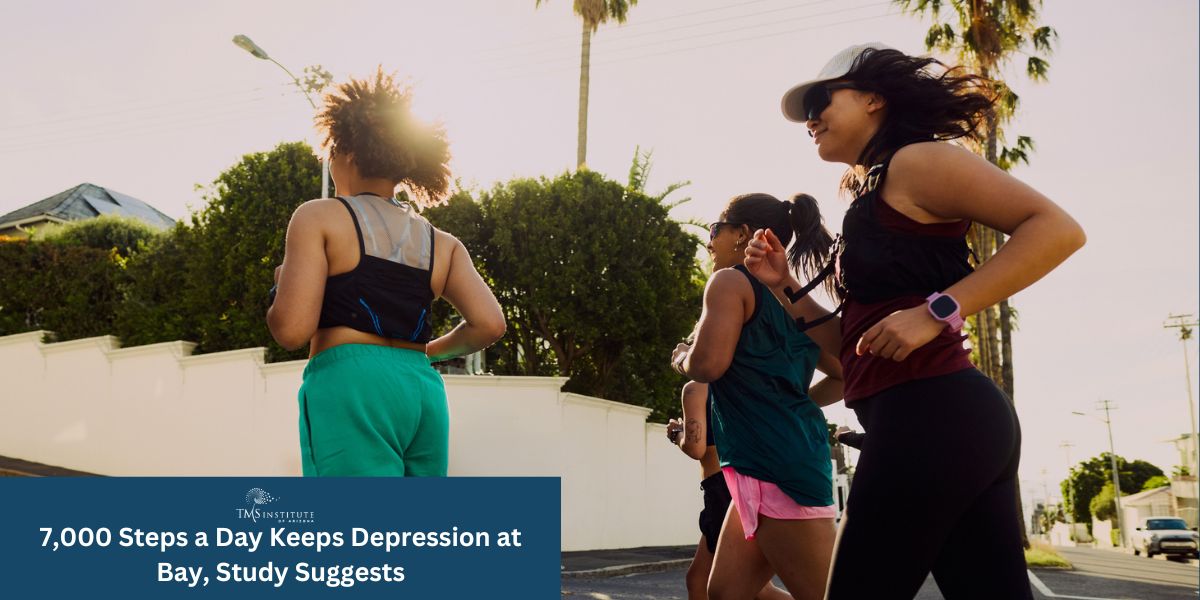
They say, “A journey of a thousand miles begins with a single step,” but did you know your daily steps could also improve mental well-being? Walking is one of the most accessible and reasonable forms of physical activity.
Yet, its effect on mental health often goes unnoticed. Recent research examines how step count impacts mood and mental resilience. Could increasing your daily steps be the solution to a healthier mind?
What Did the Study Reveal About Step Counts and Depression?
Groundbreaking research reveals a strong link between daily step counts and depression in adults. Experts analyzed 33 observational studies with data from 96,173 participants. Results show a clear, evidence-based connection between walking and improved mental health.
Key Findings from the Study
The analysis demonstrated clear trends linking step counts to mental health. Each additional step seemed to carry measurable benefits:
- 5,000 Steps a Day Makes a Difference: Walking 5,000 or more steps daily is related to fewer depressive symptoms in adults. Cross-sectional studies confirm this connection by analyzing data at a single moment. Fewer steps often correlate with higher depressive symptoms.
- 7,000 Steps Reduces Depression Risk: In prospective studies, participants who walked at least 7,000 steps daily reduced their risk of depression by 31%. Researchers calculated this reduction with a risk ratio (RR) of 0.69. The confidence interval for this data was 95% (0.62–0.77).
- Incremental Gains Add Up: Every extra 1,000 steps a day lowers depression risk by about 9%. Even small increases in daily movement offer mental health benefits.
- Higher Step Counts Are Even Better: Walking 7,500–9,999 steps per day was associated with a standardized mean difference (SMD) of -0.27 in depressive symptoms. Taking 10,000 or more steps per day lowered depressive symptoms even further (SMD: -0.26). These values show a strong inverse relationship between steps and depression.
Why Does Step Count Matter for Depression?
Walking impacts mental health through multiple mechanisms:
- Boosting Brain Function: Regular walking increases blood flow to the brain and releases endorphins, naturally improving mood and reducing stress. It also supports the growth of new brain cells in areas linked to emotion regulation.
- Breaking Sedentary Cycles: Depression frequently causes inactivity, worsening its symptoms over time. Walking introduces structure and encourages movement, breaking cycles of stillness. Consistent steps help counteract the lethargy often linked to depressive disorders.
- Promoting Serotonin and Dopamine: Sunlight exposure during outdoor walks boosts serotonin. While physical activity increases dopamine levels. Both are crucial for maintaining emotional stability.
- Encouraging Mindfulness: Walking allows individuals to disconnect from stressors, fostering a meditative state. This mental reprieve can alleviate feelings of overwhelm and sadness.
How Robust Were the Study Methods?
This review followed rigorous protocols, ensuring its findings are trustworthy and accurate:
- Large Sample Size: Data from 96,173 adults provided a comprehensive view of the relationship between walking and depression across diverse populations.
- Varied Study Designs: Researchers included cross-sectional, panel, and prospective cohort studies to examine immediate correlations and long-term effects.
- Standardized Data Analysis: Researchers used the Sidik-Jonkman random-effects method. This method produced pooled effect sizes that were consistent and statistically reliable.
- Reliable Databases: Researchers sourced data from credible databases such as PubMed, PsycINFO, Scopus, SPORTDiscus, and Web of Science. No restrictions were placed on the publication date or language, ensuring a comprehensive review.
What Are the Practical Implications?
The findings emphasize that walking is a simple, cost-effective strategy to mitigate depression risk. It is particularly beneficial because:
- Accessibility: Walking requires no special equipment, training, or membership fees. Anyone, regardless of fitness level, can start.
- Scalability: The benefits of 1,000 extra steps make it easy to integrate into daily routines. Even for those unable to meet high step-count goals.
- Comprehensive Benefits: Walking supports cardiovascular, cognitive, and emotional health, making it a holistic approach to well-being.
Limitations and Future Directions
While the study provides robust evidence, it also has gaps that need further exploration:
- Causation vs. Correlation: Most studies were observational, which cannot definitively prove causation. Further longitudinal research could clarify the protective role of walking.
- Demographic Variations: Additional research could examine how age, gender, and socioeconomic status influence the walking-depression link.
- Step Count Recommendations: Current public health guidelines focus on cardiovascular health. Expanding recommendations to include mental health outcomes could provide more holistic guidance.
What Are Other Lifestyle Changes to Improve Mental Well-Being?
Walking works best when paired with other healthy habits:
1. Prioritize Sleep
- Why It Matters: Poor sleep quality is strongly linked to depression and anxiety. Chronic sleep deprivation disrupts the brain’s ability to process emotions and manage stress.
- How to Improve It: Maintain a consistent sleep schedule. Develop a calming bedtime routine and limit screen time before bed. Aim for 7–9 hours of sleep per night.
2. Adopt a Nutrient-Rich Diet
- Why It Matters: Diet influences brain health and emotional stability. Nutritional deficiencies can worsen mood disorders, especially in omega-3 fatty acids, B vitamins, and magnesium.
- How to Improve It: Incorporate:
- Fatty fish like salmon for omega-3s.
- Leafy greens and whole grains for B vitamins.
- Nuts and seeds for magnesium.
Avoid highly processed foods and excessive sugar, which can lead to mood swings.
3. Practice Mindfulness and Stress Management
- Why It Matters: Chronic stress triggers prolonged activation of the body’s stress response, leading to burnout and emotional exhaustion.
- How to Improve It: Techniques like meditation, yoga, and deep-breathing exercises help manage stress. Mindfulness-based stress reduction (MBSR) may decrease symptoms of depression.
4. Build and Maintain Social Connections
- Why It Matters: Social isolation is also a major risk factor for mental health issues. Interpersonal relationships provide emotional support and a sense of belonging.
- How to Improve It: Make time for meaningful interactions with family and friends. Consider joining community groups or volunteering, which can create opportunities for connection.
5. Engage in Regular Exercise
- Why It Matters: Beyond walking, other forms of exercise, such as swimming, cycling, or dancing, release endorphins and improve mood. Exercise also combats physical symptoms of stress, such as muscle tension.
- How to Improve It: Pick activities you genuinely enjoy to stay consistent. Aim for 150 minutes of moderate exercise weekly, as the CDC recommends. Consistency boosts both mental and physical health.
How Can Busy Adults Incorporate More Walking Into Their Day?
Finding time to walk amidst a packed schedule can feel daunting. But, even small adjustments can make a big difference. Busy adults can make walking a consistent part of their day by:
1. Turn Commutes Into Steps
- Park Farther Away: Choose a parking spot farther from your destination to add extra steps.
- Use Public Transportation Strategically: Get off a stop or two early and walk the remaining distance.
- Walk to Work: If possible, walking all or part of your commute provides built-in exercise.
2. Incorporate Walking Into Meetings
- Walking Meetings: Some professionals and leaders incorporate walking into their workday through walking meetings. Instead of sitting in a conference room, they discuss ideas or strategize while walking outdoors or in spacious indoor areas.
- Phone Calls on the Move: Take calls while walking around your home, office, or neighborhood.
3. Make It a Family or Social Activity
- Family Walks: After dinner, go for a short walk with family members to unwind and connect.
- Meet Friends for a Walk: Replace coffee meet-ups with walking in a park or along a trail.
4. Use Breaks Wisely
- Short Walks at Work: Step away from your desk every hour for a five-minute walk. It reduces physical stiffness and mental fatigue.
- Lunch Break Walks: Dedicate part of your lunch break to walking. Even if it’s just a stroll around the block.
5. Leverage Technology
- Track Your Steps: Use fitness trackers or smartphone apps to monitor daily progress and set realistic goals.
- Set Reminders: Schedule notifications to remind you to get up and walk throughout the day.
6. Turn Chores Into Opportunities
- Grocery Shopping: Walk up and down every aisle, even if your list is short.
- Household Activities: Vacuuming or yard work can contribute to step counts.
7. Plan Leisure Walks
- Explore Local Trails: Save weekend time to explore hiking paths or urban walking routes.
- Walk During Screen Time: If watching TV, walk in place. You can also use a treadmill.
How Can TMS Therapy Complement Your Mental Health Efforts?
Walking can enhance mental health. However, some people may need additional support. Specific conditions like depression or anxiety benefit from advanced treatments. Transcranial Magnetic Stimulation (TMS) targets underactive brain areas associated with mood disorders.
It’s non-invasive, FDA-approved, and relieves individuals who haven’t responded to traditional therapies. The TMS Institute of Arizona provides treatments designed specifically for each individual. Our team combines proven science with compassionate care to support your well-being. Contact us today. Learn how TMS can complement your mental wellness efforts.
References
CDC. (2024, November 7). Adding Physical Activity as an Adult. Physical Activity Basics. https://www.cdc.gov/physical-activity-basics/adding-adults/index.html
Bizzozero-Peroni, B., Díaz-Goñi, V., Jiménez-López, E., Rodríguez-Gutiérrez, E., Sequí-Domínguez, I., Núñez de Arenas-Arroyo, S., López-Gil, J. F., Martínez-Vizcaíno, V., & Mesas, A. E. (2024). Daily Step Count and Depression in Adults. JAMA Network Open, 7(12), e2451208. https://doi.org/10.1001/jamanetworkopen.2024.51208













